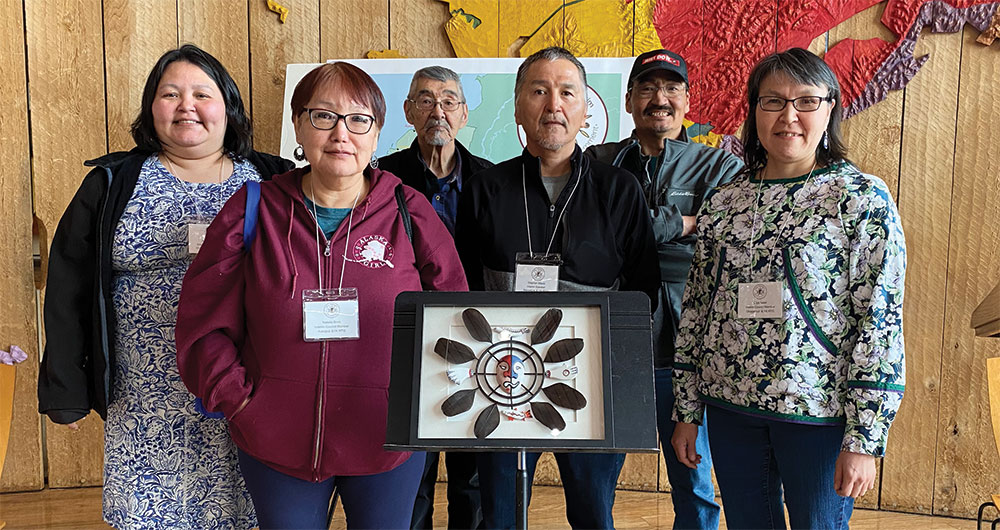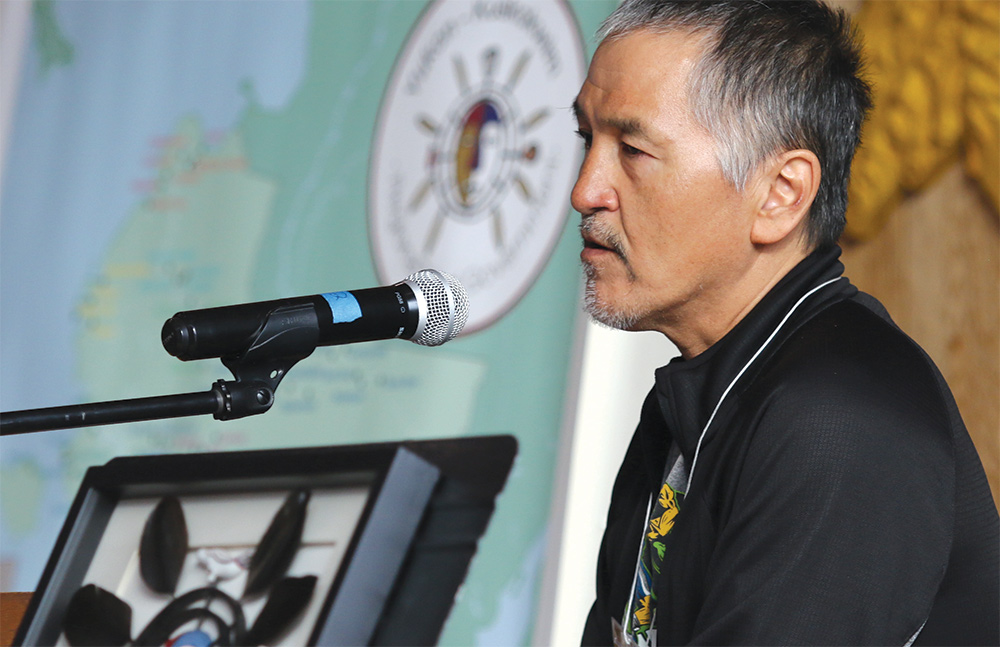
The current Interim Council (left to right: Roberta Murphy, Natalia Brink, Moses Owen, Stephen Maxie, Jr. (Speaker), Simeon Fairbanks, and Olga Isaac) during the Y-K RTG Summit.
If We Do Nothing, We Get Nothing
Author’s disclosure: Mike Williams Sr. is my direct Uncle, Willie Kasayulie and Phillip Peter Sr. are my Uncles, and I am a Calista shareholder.
he territory of 56 individual Yup’ik federally-recognized Tribal governments along the lower Yukon and Kuskokwim Rivers (Y-K Delta) is approximately the size of Oregon, the tenth largest state. It is also one of, if not the, poorest regions in the United States regarding infrastructure. So what would it look like if those individual Tribes formed a governing body to strengthen them all? On April 28, 2022, in Anchorage, Tribes from the region gathered at the Alaska Native Heritage Center to find out.
Opening remarks from Calista Board Chair Willie Kasayulie, among others from the interim governing body, quickly made it clear that the Yukon-Kuskokwim Regional Tribal Government (Y-K RTG) is not Calista Corporation, nor does Calista have any power over it. They provide initial financial and legal support until the government can self-sustain.
The Y-K Delta RTG comprises Tribal governments to help strengthen individual Tribes through collective power and sharing of governing resources. On February 22, 2021, a draft constitution was adopted. Copies of the Constitution and Charter can be found on the Y-K RTG website.
The concept of uniting Yup’ik Tribes has been in action for 40 years and an RTG has been in the discussion even before the passage of the Alaska Native Claims Settlement Act.
Chief Mike Williams Sr. explains efforts from the past and the formation of the Yupiit Nation:
Chief Mike Williams Sr. continues, “We believe that the Regional Tribal Government is essential to preserve, promote, and protect the culture, heritage, and traditions of the Yupiit Nation and its people.”
- Food insecurity from drastically low salmon returns and the need for Tribal management of those food sources.
- Law enforcement in the Region moves beyond second-class citizenship with the VPSO program.
- Addressing 14(c)(3) in ANCSA to return the land back to Tribes.
These issues, among others, were passionately discussed and agreed upon. How the problems would be solved, the function of the Y-K RTG, and how democracies are formed were not as unified and, at times, led to debates that seemed to run in circles.
Robert Beans, a Calista Board Member originally from Mountain Village, stated, “It’s not perfect, nor is it ever going to be perfect. I’ve been doing this work for over 40 years and I still have questions. But if we do nothing, we get nothing.”
Y-K RTG elected Speaker Stephen Maxie Jr. of Napaskiak echoed the message, “If you don’t like it, then join us, help us make it better.”

Stephen Maxie Jr. spoke at the Y-K RTG Summit.
photo courtesy of Y-K RTG
In a written statement, James Akerelrea said:
The actualization of Tribal sovereignty while existing as a colonized people is a challenging philosophical riddle to crack and even harder to practice. What does sovereignty look like if our Tribal Governments do not control our ancestral lands? How can we create a road map to that destination if none of us has seen it in our lifetimes?
Although I think these questions are vital to the process of Decolonizing and Indigenizing, they can lead to existential rabbit holes keeping us from taking action. As Mr. Beans said, “if we do nothing, we get nothing.” The Region faces endangered salmon, climate change, drastically high rights of suicide and abuse, and no way to enforce Tribal laws or regional infrastructure to deal with these crises. We also have a window of opportunity for collaboration with the Federal government, which we have never seen, with the current positions held by U.S. Secretary of the Interior Deb Haaland and Congresswoman Mary Peltola.
Towards the end of the last Y-K RTG meeting, Phillip Peter Sr. of Akiachak said, “We are losing because we are divided.” He continued, “The Old Ones, they never repeated themselves. When they wanted something done, they would say it once and the next day, it would be built.”
Stay current by following the Y-K RTG on their website and Facebook page.